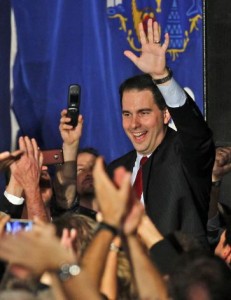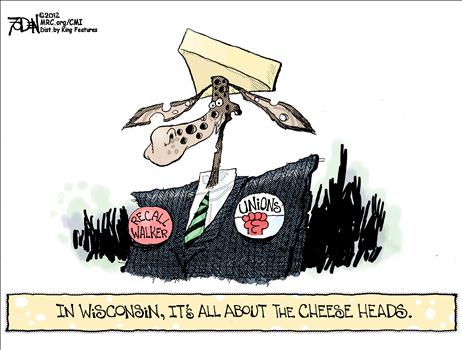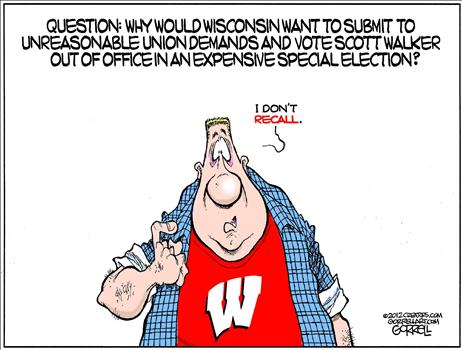 Scott Walker’s victory yesterday in the Wisconsin governor’s recall election was a triumph for common sense. Walker, a genuine Christian man who walked out his convictions—doing what he said he would do when he was first elected—had to endure a year and a half of death threats, massive rallies, an “occupy movement,” if you will, of the Wisconsin State House, and an attempt to oust him from office, not for any misdeeds or corruption, but simply for disagreement over policy.
Scott Walker’s victory yesterday in the Wisconsin governor’s recall election was a triumph for common sense. Walker, a genuine Christian man who walked out his convictions—doing what he said he would do when he was first elected—had to endure a year and a half of death threats, massive rallies, an “occupy movement,” if you will, of the Wisconsin State House, and an attempt to oust him from office, not for any misdeeds or corruption, but simply for disagreement over policy.
Let’s review what the beef was, as well as how Walker’s reforms have played out in the state. One of the biggest problems Wisconsin faces is its own semi-radical history. It was the first state, in 1959, to allow collective bargaining for public employees. As Baby Boomers began retiring, the pensions owed to them via this bargaining brought the state to the edge of financial ruin. Walker merely sought to curb this out-of-control union power. The unions reacted vociferously, and with the aid of Democrat legislators who fled the state to try to forestall the changes [now there’s a model of good governance if ever there was one], they have dragged out this battle for what seems like forever.
Walker and the Republican majority in the legislature—put there by the people in 2010—fulfilled their promises to the electorate despite the threats and a nationwide effort to defeat a Wisconsin Supreme Court judge in another election. They failed. So then they turned their guns on Walker directly, along with his lieutenant governor. Again, a national juggernaut was created, led by the big unions in cooperation with the Democrat party. They have now failed again.
It’s a little hard to convince most state citizens to remove a man from office who has spearheaded reforms that appear to be working. Let me quote one commentator from Forbes who has summarized the results nicely:
The state budget has been balanced. The unemployment rate has been dropping and is now below the national average. Property taxes are down. Fraudulent sick leave policies—which allowed employees to call in sick and then work the next shift for overtime pay—have been ended. The government has stopped forcibly collecting union dues from workers’ paychecks. Best of all, the myth that union bosses represent their members’ interests has been exposed as a lie. Now that union dues are voluntary, tens of thousands of union members have stopped paying them. Membership in the Wisconsin chapter of the American Federation of State, County and Municipal Employees union (AFSCME) has dropped by half. Membership in the state’s American Federation of Teachers (AFT) is down by over a third.
In other words, fiscal health and sanity have returned. All this, and public employees still have benefits that are 22% above the private sector. That’s hardly draconian. No wonder voters turned down the recall.
Why would anyone of sound mind desire to return to the former state of affairs?
What does this election mean for the bigger picture? It could mean Wisconsin is in play for Republicans in the presidential election. A state that put Republicans in the majority in 2010, and which has reaffirmed that choice just now, may be ready to switch political columns. Did you notice that President Obama avoided going to Wisconsin during this time? His people knew it was a losing proposition; they didn’t want his image saddled with another loss. One can only hope this Wisconsin election is a portent of what we will see in November.


